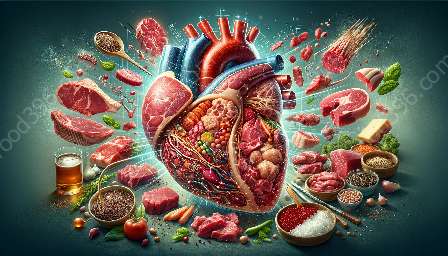When it comes to sports performance, the role of nutrition cannot be overlooked. In recent years, there has been a growing interest in the impact of meat on athletic performance. This topic cluster seeks to explore the relationship between meat consumption, nutrition, and sports performance, while delving into the scientific aspects of meat as a dietary component. By understanding the interconnectedness of meat, sports performance, nutrition, and science, athletes and fitness enthusiasts can maximize their potential and overall well-being.
The Importance of Meat in Sports Nutrition
Meat has long been recognized as a valuable source of nutrients essential for optimal health and physical performance. Athletes, in particular, have unique nutritional needs due to the demands placed on their bodies during training and competition. Proteins found in meat are crucial for muscle repair and recovery, making it a staple in many athletes' diets. Additionally, meat provides vital micronutrients such as iron, zinc, and various B vitamins that contribute to energy metabolism and overall physiological function.
Athletes rely on high-quality protein to aid in muscle repair and growth, as well as to support the body's immune system. The amino acids present in meat, especially those considered essential, play a key role in muscle protein synthesis, which is crucial for muscle recovery and adaptation to training. Furthermore, the heme iron found in animal-derived foods, such as red meat, is more readily absorbed by the body compared to non-heme iron found in plant-based foods. This is particularly important for athletes, as iron deficiency can lead to decreased performance and increased fatigue.
Meat as a Source of Sustained Energy
In addition to its role in muscle recovery, meat provides a source of sustained energy due to its high-quality protein and fat content. The inclusion of lean cuts of meat in an athlete's diet can contribute to a steady release of energy, which is essential for endurance sports and prolonged physical exertion. Moreover, the presence of creatine in meat has been linked to improved strength and power performance, making it a sought-after dietary component for athletes engaged in power-based activities.
Scientific Perspectives on Meat and Sports Performance
From a scientific standpoint, research into the relationship between meat consumption and sports performance has yielded valuable insights. Studies have demonstrated that the amino acid profile of meat aligns closely with the needs of athletes, particularly in promoting muscle recovery and adaptation. Furthermore, advancements in meat science have led to a deeper understanding of how different types of meat, preparation methods, and timing of consumption can impact performance and recovery in athletes. For example, the consumption of lean red meat, such as beef, has been associated with improved iron status and enhanced athletic performance due to its iron and protein content.
Moreover, ongoing research is exploring the potential benefits of specific nutrients and bioactive compounds found in meat, such as taurine and carnitine, on athletic performance. These compounds have been linked to improved exercise capacity, energy metabolism, and muscle function, thereby showcasing the multifaceted nature of meat as a dietary source for athletes.
Meat Nutrition: Balancing Quality and Quantity
While meat can offer numerous benefits for sports performance, it is essential for athletes to approach meat consumption with a balanced and informed perspective. The quality and quantity of meat intake, as well as its integration within a well-rounded diet, are critical considerations. Opting for lean cuts of meat, incorporating a variety of protein sources, and balancing meat consumption with ample fruits, vegetables, and whole grains can ensure that athletes harness the nutritional benefits of meat while maintaining overall dietary balance.
It is important to note that individual differences in dietary requirements, as well as ethical and environmental considerations, may influence an athlete's choices regarding meat consumption. As such, personalized nutrition guidance, informed by evidence-based practices and a thorough understanding of meat science, can help athletes make informed choices that align with their performance goals and values.
Conclusion
In conclusion, the relationship between meat and sports performance is multifaceted and holds significant implications for athletes and active individuals. Understanding the nutritional and scientific aspects of meat, as well as its role in supporting athletic performance, can empower individuals to make informed dietary choices that optimize their physical capabilities and overall well-being. By appreciating the dynamic interplay between meat, sports nutrition, and scientific advancements, athletes can leverage the benefits of meat consumption while navigating the nuances of dietary optimization, ultimately enhancing their athletic journey.

